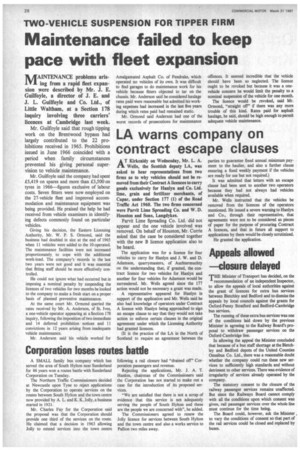Maintenance failed to keep pace with fleet expansion
Page 28

If you've noticed an error in this article please click here to report it so we can fix it.
MAINTENANCE problems arising from a rapid fleet expansion were described by Mr. J. E. Guilfoyle, a director of J. E. and J. L. Guilfoyle and Co. Ltd., of Little Waltham, at a Section 178 inquiry involving three carriers' licences at Cambridge last week.
Mr. Guilfoyle said that rough tipping work on the Brentwood bypass had largely contributed to the 22 prohibitions received in 1965. Prohibitions issued in June 1966 coincided with a period when family circumstances prevented his giving personal supervision to vehicle maintenance.
Mr. Guilfoyle said the company had spent £5,419 on spares and more than £3,500 on tyres in 1966—figures exclusive of labour costs. Seven fitters were now employed on the 27-vehicle fleet and improved accommodation and maintenance equipment was being provided. He praised the help he had received from vehicle examiners in identifying defects commonly found on particular vehicles.
Giving his decision, the Eastern Licensing Authority, Mr. W. P. S. Ormond, said the business had doubled in size at the end of 1465 when 11 vehicles were added to the 10 operated. The maintenance facilities were not increased proportionately to cope with the additional work-load. The company's records in the last two years were not good and it was essential that fitting staff should be more effectively controlled.
He could not ignore what had occurred but in imposing a nominal penalty by suspending the licences of two vehicles for two months he looked to the company to make a fresh start on a proper basis of planned preventive maintenance.
At the same court Mr. Ormond queried the rates received by Mr. A. Anderson, of St. Ives, a one-vehicle operator appearing at a Section 178 inquiry, following the imposition of two immediate and 14 deferred prohibition notices and 11 convictions in 12 years arising from inadequate vehicle maintenance.
Mr. Anderson said his vehicle worked for
Amalgamated Asphalt Co. of Fendrake, which operated no vehicles of its own. It was difficult to find garages to do maintenance work for his vehicle because fitters objected to tar on the chassis. Mr. Anderson said he considered haulage rates paid were reasonable but admitted his working expenses had increased in the last five years during which rates paid had remained static.
Mr. Ormond said Anderson had one of the worst records of prosecutions for maintenance offences. It seemed incredible that the vehicle should have been so neglected. The licence ought to be revoked but because it was a onevehicle concern he would limit the penalty to a nominal suspension of the vehicle for one month.
The licence would be revoked, said Mr. Ormond, "straight off" if there was any more trouble of this kind. Rates paid for asphalt haulage, he said, should be high enough to permit adequate vehicle maintenance.
















































































































